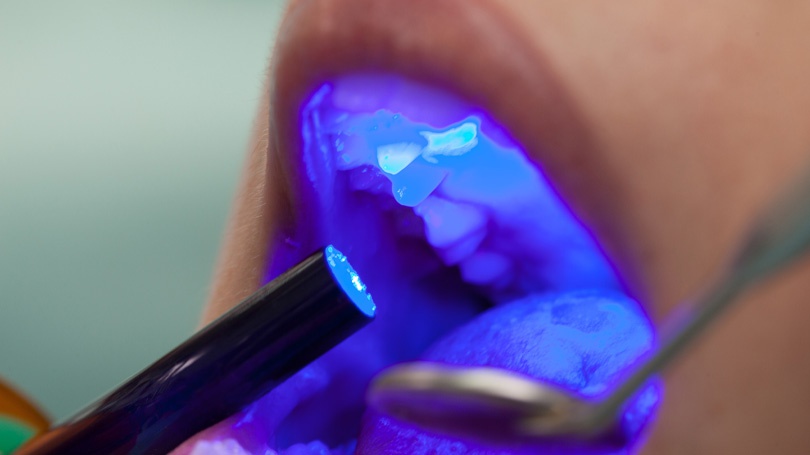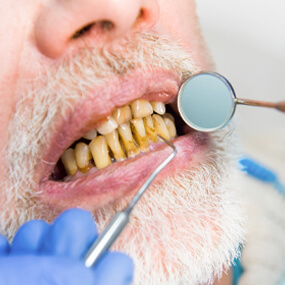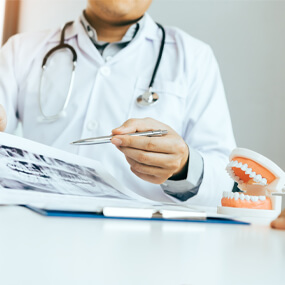The Importance of Dentists and Early Cancer Detection

The American Dental Association recommends that everyone should visit their dentists at least twice a year. These appointments are an opportunity to have your teeth professionally cleaned by an oral hygienist and have your teeth and gums examined by your dentist. But dental exams are not limited to the oral cavity. Many dentists examine the head, neck, and lymph nodes and even screen for cancer.
The American Cancer Society estimates that there will be about 53,000 new oral cancer diagnoses made in 2020. In addition, about 11,000 people will die of either oral cavity cancer or oropharyngeal cancer. Although other cancers garner much of the media attention, the death rate for oral cancer is quite high and above cervical cancer, testicular cancer, laryngeal cancer, and Hodgkin’s disease.
The term oral cancer encompasses all cancers of the cheek, hard palate, lips, mouth floor, soft palate, throat, and tongue. It often begins with a white patch that is painless but persists. That patch will continue to grow and eventually become ulcerous and can lead to pain, swelling, numbness, and difficulties chewing and swallowing. Despite the fact that oral cancer is quite lethal, it is also largely preventable if the disease is caught early enough, which is why oral cancer screening is so important.
Oral Cancer Screening and Risk Factors
While most dentists perform oral cancer screenings, not all do. You should discuss this with your dentist, and if he or she does not offer the service, you should consider seeking a dentist that does.
Prior to your screening, your dentist or dental hygienist will ensure that your medical history is accurate. If you have been diagnosed with a health issue or prescribed new medications since your last visit, this information will be added to your file on record. Your medical history likely contains your answers to questions concerning oral cancer risk factors. It may be necessary to update these answers as well.
Oral cancer is more common in people who drink alcohol heavily and people who smoke cigarettes as well as cigars, pipes, and so forth. Smokeless tobacco products are also a risk factor and heighten the chance of developing oral lesions. As for alcohol consumption, note that the Centers for Disease Control and Prevention defines heavy drinking as averaging two drinks a day for males and averaging more than one drink a day for females. People who experience prolonged and ongoing sun exposure are more prone to lip cancer. Oral human papillomavirus can infect the mouth and lead to oropharyngeal cancer. Diets low in vegetables and fruits are a risk factor, and a person who has experienced oral cancer is much more prone to experiencing it again in the future, and so must be even more vigilant.
The Warning Signs Your Dentist Will Look For
Basic oral screening involves a manual examination. That is generally adequate for a person in good health, but your dentist may use additional tests depending on your risk factors. During the basic examination, your dentist will look for:
- White or red patches
- Lumps or thick or hard spots
- Sores that bleed easily or do not heal
- Roughened or crusted areas
Other indications can include pain, tenderness, or numbness, as well as changes to your bite. Your dentist may ask you about these signs, but you should volunteer the information if you have experienced them. Tell your dentists about issues with chewing, swallowing, speaking, or moving your tongue or jaw.
The Role of the Dentist in Oral Cancer Screening
Dentists play an integral role in early diagnoses of oral cancer and other diseases through what is called opportunistic screening. Patients are visiting their dentists for dental exams but can be pre-diagnosed for oral cancer, diabetes, obstructive sleep apnea, and so on. Dental exams often extend beyond the teeth and gums to the neck, head, face, and so forth. It is important to note that if your dentist identifies a potential problem, this will be a pre-diagnosis as opposed to a final diagnosis. Your dentist will refer you to a specialist who will perform a biopsy to determine if you have cancer. If the issue is not cancerous, then it may heal on its own in time, or your dentist may recommend a particular treatment.
Get Screened for Oral Cancer
More than 50,000 Americans will be diagnosed with oral cancer this year. A positive note is that 90 percent of all oral cancer cases are curable with early discovery. The downside is that early stages are often not symptomatic. Your dentist is pivotal in this regard. Jeffrey D. Clark, DDS, and the entire team at Scottsdale Cosmetic Dentistry Excellence are committed to detecting oral cancer and saving lives. Patient interviews and education can mitigate risk factors. Dr. Clark performs oral cancer screenings for every patient he sees. The technology employed has proven successful for identifying symptoms. Dr. Clark stays current with all risk factors through ongoing education and engages in interprofessional collaboration. In addition, all of the hygienists on staff are trained in the identification of unusual lesions. Annual oral cancer screening is painless and fast. It could save your life, so call us today at 480 585 1853 to schedule your exam.




